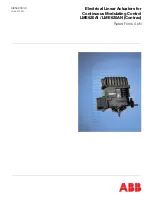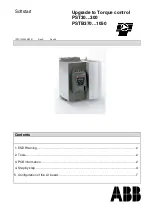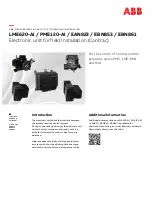
PPCH™ OPERATION AND MAINTENANCE MANUAL
© 2009 DH Instruments, a Fluke Company
Page 130
4.5.3
STANDARD EVENT REGISTER
The PPCH contains an 8 bit Standard event register that reflects specific PPCH events.
Enabled events in this register will set or clear the ESB bit of the Status Byte Register.
Table 22.
8 bit standard event register
PON
(128)
URQ
(64)
CMD
(32)
EXE
(16)
DDE
(8)
QYE
(4)
RQC
(2)
OPC
(1)
This register can be read using the “*ESR?” query, Each of these status bits can set the ESB
bit of the Status Byte Register, causing a SRQ to occur IF the ESB bit is enabled to do so.
The Standard Event Status Enable Register (“*ESE” program message ) determines which of
these flags are able to assert the ESB bit. The description of these bits are given as:
PON
Power On (Bit 7)
Indicates that the PPCH power has been cycled since the last time this bit was
read or cleared.
URQ
User Request (Bit 6)
Indicates that the PPCH was set to local operation manually from the front panel
by the user (pressing the
[ESC]
key).
CMD
Command Error (Bit 5)
Indicates that a remote command error has occurred. A command error is
typically a syntax error in the use of a correct program message.
EXE
Execution Error (Bit 4)
Indicates if a remote program message cannot be processed due to device
related condition.
DDE
Device Dependent Error (Bit 3)
Indicates that an internal error has occurred in the PPCH such as a transducer
time-out.
QYE
Query Error (Bit 2)
Indicates that an error has occurred in the protocol for program message
communications. This is typically caused by a program message being sent to
the PPCH without reading a waiting reply.
RQC
Request Control (Bit 1)
This bit is not supported as the PPCH cannot become the active controller in charge.
OPC
Operation Complete (Bit 0)
Indicates that the PPCH has completed all requested functions.
4.5.4
READY STATUS REGISTER
The PPCH contains an 8 bit Ready Status Register that reflects specific PPCH measurement
and generation ready events. Enabled events in this register will set or clear the RSB bit of
the Status Byte Register.
Table 23.
8 bit ready status register
N/A
(128)
N/A
(64)
N/A
(32)
N/A
(16)
N/A
(8)
MEAS
(4)
NRDY
(2)
RDY
(1)
This register can be read using the
“*RSR?”
query, Each of these status bits can set the
RSB bit of the Status Byte Register, causing a SRQ to occur IF the RSB bit is enabled to do so.
















































